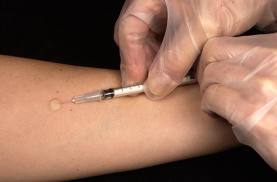I was fortunate to have the opportunity to represent the Hepatitis B Foundation at yesterday’s FDA vaccine advisory panel review of Dynavax’s new HEPLISAV vaccine for hepatitis B. I was there for the public comment period on the second day of the meeting with my prepared statement. I was surprised to find I was the only one there for public comment. Since I’ve never been to anything like this, I don’t know if that is typical or not. I think my personal story with HBV, and the message from the HBF was important for the FDA panel to hear, so they were sure to be reminded that there are real people affected by chronic hepatitis B.
There has been a great deal of good press about the new Dynavax vaccine. In studies it has superior immunogenicity when compared to the currently available vaccines. Immunity is generated in 2 doses given one month apart, versus the currently available vaccines where it is a three shot series over 6 months. This is particularly important to subpopulations such as those undergoing dialysis, and diabetic adults who are encouraged to be vaccinated against hepatitis B – a new recommendation by the CDC this year. It is also important to the general adult population, where it is found that 30-50% of adults may not complete the 3 shot HBV vaccine series making them vulnerable to infection. This need for HBV prevention via a more effective vaccine, particularly in needy subpopulations was what was stressed in HBF’s public statement.
I do believe the panel was well aware of the importance of HBV prevention and one doctor made mention of the importance based on “the public comment”, so they were listening. Another doctor mentioned the burden of the disease not only globally, but also in the US. That is often understated.
The FDA panel met both Wednesday and Thursday. The public comment period was Thursday, and I remained there for the vote on two vital questions. The first question was about whether the immunogenicity data was adequate to support the effectiveness of HEPLISAV for the prevention of hepatitis B infection in adults 18 through 70 years of age? The vote cast showed unanimous agreement in the efficacy of the vaccine.
The other question was about whether the data was adequate to support the safety of HEPLISAV when administered to adults 18 through 70 years. Five members said “yes”, 1 abstained and 8 voted “no”.
Prior to both votes there was a great deal of discussion amongst the panelists, and the representative from Dynavax who responded directly to questions.
Ultimately it came down to a few key points. It was clear that the panel was impressed with efficacy or level of immunity generated by this new, 2 shot series. This vaccine uses a unique adjuvant. An adjuvant is a substance that is added to the vaccine in order to increase the body’s immune response to the vaccine. In this case it was a nucleic acid versus a lipid – details of which I do not even pretend to understand. Although this new adjuvant was exciting based on the great immunogenicity data presented by Dynavax, it was also a source of concern because the panel was not sure if there was enough study data that represented all demographics. In other words, this vaccine performed really well, but they weren’t sure if it had been proven safe in different ethnic groups such as African Americans, Asian-Americans, and Hispanics. Since the US is a melting pot, this is important.
The other concern was that the vaccine had not been administered along with other vaccines. Because this vaccine is to be given to adults, they felt it was important that it could be given when an adult came in for their annual flu shot, or another immunization. Adults just don’t get to the doctor’s office that often! Although this was clearly of interest, it was not a deal breaker like the lack of safety data among all demographics. There was the suggestion to introduce the vaccine into the current sub-populations that were in particular need, but not much discussion beyond.
The votes were cast and the panel and the audience dispersed. Looks like Dynavax will need to complete further studies before the vaccine is once again reviewed by the FDA panel for approval. Personally, I believe there’s a real need and a place for this vaccine, but of course safety always comes first.




